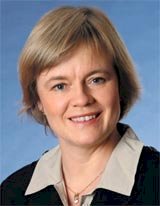International Keynote
Prof. Dr. Med. Eva Hummers
Head of Institut für Allgemeinmedizin
Department of General Practice, Universitätsmedizin Göttingen/University Medical Center, Georg-August-Universität, Göttingen, Germany.
WONCA Europe Honorary Secretary
EGPRN Chair 2010-2013
From remote sensors to digital health – A SWOT attempt
SCREEN –AF is a randomized controlled diagnostic trial that recruited 856 patients from 48 family practices in Canada and Germany. An adhesive skin patch continuously recording an ECG for 2 weeks was used to screen for atrial fibrillation episodes in moderate-to-high risk patients, and compared to usual care. The trial will be presented as an example of remote sensor use, which may be perceived as an entry to E-health in primary care.
Implementation and routine use of various E-health tools or applications vary widely across Europe: While use and access to connected electronic patient records by several care providers across healthcare levels, or patients themselves, is a matter of course in some countries, it may be considered quite revolutionary and threatening in others (for example with regard to data privacy, or liability issues). The same holds true for telemedicine approaches, electronic communication between GPs and patients, the use of mobile devices or software “apps”. Some GPs or other stakeholders may see opportunities for effective organization of care, or better diagnosis and monitoring of health conditions, or more individualized treatments. Others are concerned that introducing more e-technology may eat away at person-centered, biopsychosocial care, or other key features of family medicine.
Many patients like to consult “Dr. Google” before or along with their own family doctor, even if some may be struggle to cope with the information obtained. Health conscious citizens purchase wearable sensor devices, believing that “tracking” health related parameters will maintain or improve their health. Many share their data with the manufacturers of these devices or the appendant software, or social media platforms. Others may face difficulties when required to administrate their health insurance or healthcare provider appointments online.
In parallel, the health and healthcare sector is a huge business opportunity for technology, software or smart service companies, who already invest massively into developing and marketing health related products – and apparently perceive a good return of investments.
From both a family doctor and a researcher perspective, it does not seem wise to ignore the brave new world of digital health. It certainly has weaknesses and threats. However, it also offers strengths and opportunities to family doctors and their patients, and certainly to researchers, who can discover, develop, and evaluate the new features of a digital culture against the background defined by the core characteristics of general practice/family medicine.

